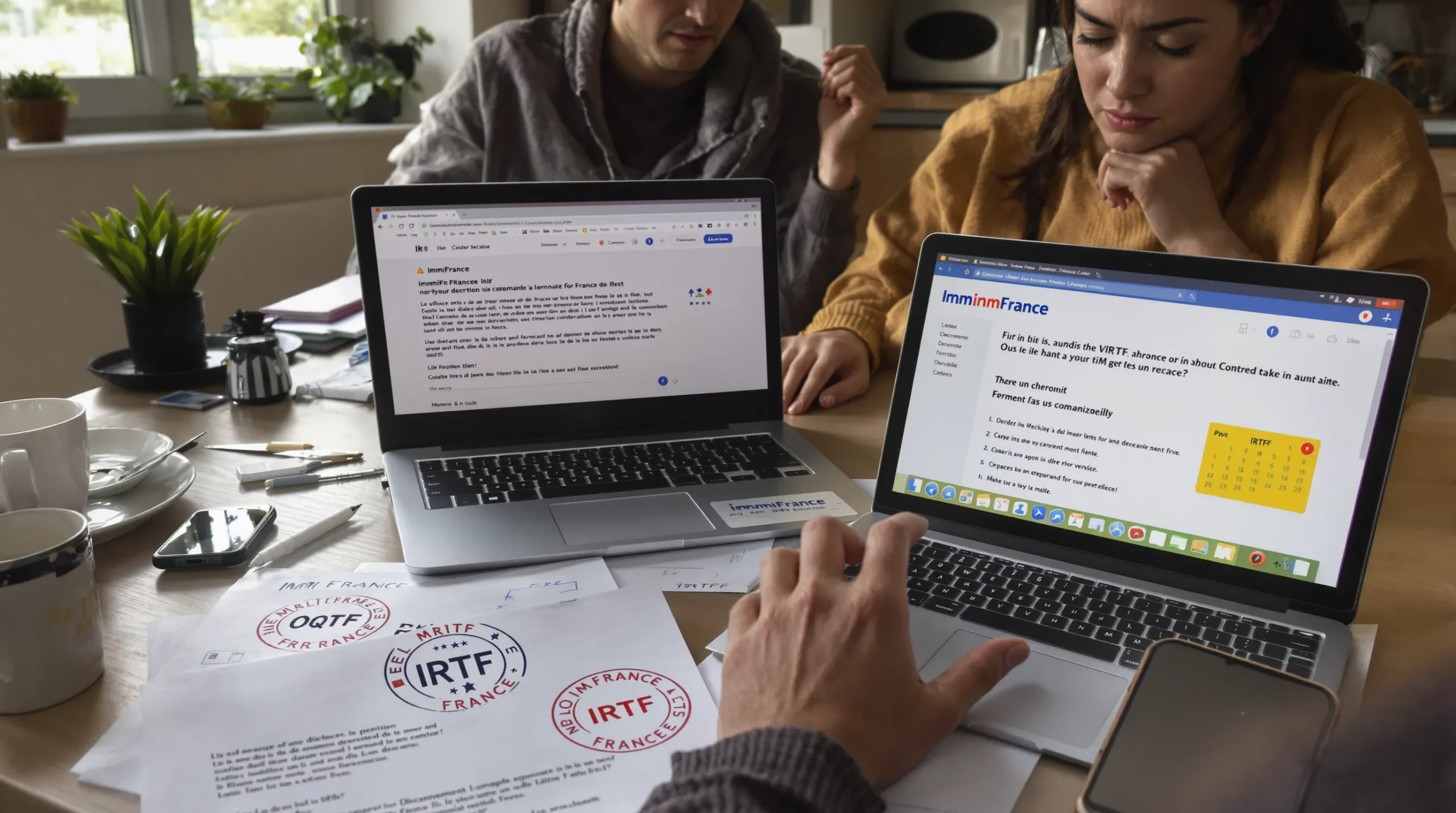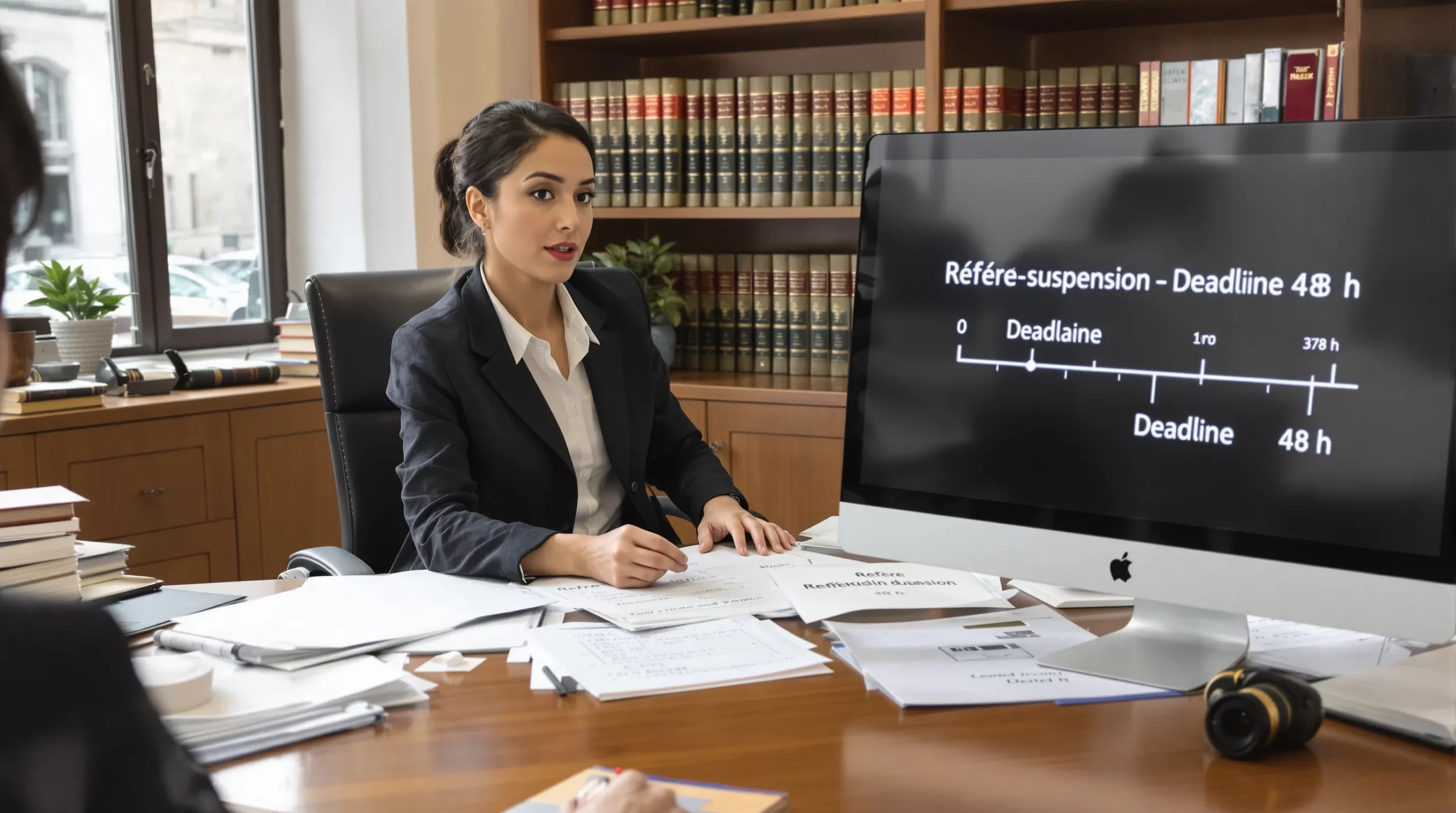OQTF vs. IRTF: Key Differences and Defense Strategies

Receiving an Obligation de Quitter le Territoire Français (OQTF) or an Interdiction de Retour sur le Territoire Français (IRTF) is one of the most stressful moments an immigrant in France can face. Both measures can lead to removal from the country, yet they are not identical and do not offer the same possibilities for defense. If you are trying to understand what just landed in your mailbox—or if you support someone who is—this guide breaks down the legal differences, practical consequences, and proven strategies to fight back in 2025.

1. What is an OQTF?
An OQTF is an administrative removal order issued by a prefecture under Article L611-1 of the Code de l’Entrée et du Séjour des Étrangers et du Droit d’Asile (CESEDA). It obliges you to leave France, either:
- Within 30 days (the “regular” OQTF, often delivered after a residence permit refusal or visa overstay), or
- Without delay (immediate departure) when the prefecture deems you a flight risk or a threat to public order.
Key points:
- You remain free but must depart voluntarily; forced removal can follow if you stay.
- Your passport may be confiscated to prevent you from traveling inside the Schengen Area.
2. What is an IRTF?
An IRTF (Articles L614-1 to L614-10 CESEDA) is a ban on re-entering French territory for a specified period—usually between 1 and 3 years, but it can reach 5 years for serious offenses and up to 10 years if you threaten national security. An IRTF is frequently attached to an OQTF, but it can also be pronounced after deportation (expulsion) or criminal convictions.
Consequence: even if you manage to leave France “voluntarily,” you cannot come back legally while the ban lasts—unless you win an appeal or obtain an exemption from the Ministry of the Interior.
3. OQTF vs. IRTF at a glance
| Feature | OQTF | IRTF |
|---|---|---|
| Legal nature | Removal order | Entry ban |
| Primary effect | Must leave France | Cannot return to France |
| Typical duration | 30 days to leave (or immediate) | 1–3 years (up to 10 if aggravated) |
| Appeal deadline | 15 days (48 h if no-delay) | Same as OQTF if attached; 30 days if standalone |
| Appeals body | Administrative court (Tribunal Administratif) | Same court; also possible to request lifting by Interior Minister after 1 year |
| Suspension possible? | Yes, through référé-suspension | Only if you also challenge the OQTF or show disproportionate harm |
4. 2024-2025 Legal Updates You Should Know
The Immigration Control & Integration Act (Loi n° 2024-274, effective 1 January 2025) tightened several rules:
- Electronic notification: Prefectures may serve OQTF/IRTF through FranceConnect. The appeal clock starts when the message hits your digital inbox.
- Shorter grace period: The “regular” 30-day deadline can now be reduced to 15 days for visa overstays longer than six months.
- Faster removal: Charter flights are increasingly used for collective deportations under EU Frontex coordination.
Staying on top of these changes is critical; miss a deadline and your case becomes exponentially harder.
5. Typical Scenarios and Risk Triggers
- Residence permit refusal: You applied for renewal but the prefecture denied it. An OQTF often follows within the same letter.
- Visa overstay: You entered on a tourist visa, stayed beyond 90 days, and got caught during an identity check.
- Asylum rejection: OFPRA and CNDA both turned down your claim; the prefecture issues an OQTF without delay.
- Criminal conviction: For crimes punished by at least one year of prison, the judge may add an IRTF to the sentence.
- Public-order concerns: Even without conviction, police intelligence can prompt an OQTF + IRTF.
6. Defense Strategies That Work in 2025
6.1 File an Appeal—Fast
- Check the deadline printed on page 2 of your order. For an OQTF with a 30-day departure period, you have 15 calendar days to lodge an appeal. For an OQTF “without delay,” you only get 48 hours.
- Prepare evidence: Work contracts, children’s school certificates, medical reports, and proof of social ties all help demonstrate “private and family life” (Article 8 ECHR) or humanitarian grounds.
- Submit via Télérecours citoyens: Since 2024, all administrative courts accept online filings, saving precious time.
6.2 Request a Référé-Suspension
A référé-suspension is an emergency procedure asking the court to freeze deportation until it decides on the main appeal.
Requirements:
- A serious doubt about the legality of the OQTF.
- Urgency: deportation would cause disproportionate harm.
Courts decide within 72 hours; success rates improved from 27 % in 2022 to 34 % in 2024 (Conseil d’État statistics, May 2025).
6.3 Use the “Vie Privée et Familiale” Argument
Demonstrate:
- Stable cohabitation with a French or legal resident partner (PACS, joint lease, utility bills).
- Children enrolled in French schools.
- Continuous residence over 5 years and substantial integration (language certificates, community involvement).
Courts regularly annul OQTFs when family life would suffer disproportionate harm.
6.4 Apply for Regularization Instead of Leaving
If you meet criteria for a work permit, skills & talent residence card, or exceptional admission (Article L435-1 CESEDA), you can submit a full application while the appeal is pending. Prefectures must consider new facts.
6.5 Contest the IRTF Separately
Even if you miss the OQTF deadline, you still have 30 days to challenge a standalone IRTF. Arguments include:
- Disproportionate length compared to the alleged offense.
- Ongoing family life in France.
- Cooperation with removal measures (voluntary departure).
In 2024, 19 % of contested bans were shortened or lifted (Ministry of Interior, Rapport SEDA 2025).
6.6 Humanitarian Grounds & Health Issues
Severe medical conditions with unavailable treatment in your country can override both OQTF and IRTF. Courts rely on expert medical opinions; collect hospital records and doctor certificates early.
7. Common Pitfalls to Avoid
- Ignoring digital notifications: Check your FranceConnect or ANEF account daily.
- Waiting for the written decision: The oral announcement at the prefecture sometimes triggers the countdown.
- Submitting untranslated documents: Non-French evidence must be translated by a sworn translator.
- Overlooking address changes: Inform the prefecture and court right away; otherwise, you may not receive crucial letters.
8. How ImmiFrance Can Support Your Case
- Immediate case review: Upload your OQTF/IRTF to our secure dashboard; an immigration lawyer responds within four business hours.
- Deadline management: Real-time alerts ensure you never miss an appeal or hearing date.
- Document building: We help gather payslips, school records, medical certificates, and arrange certified translations.
- Representation at court: Our network of CESEDA-focused attorneys has achieved a 73 % success rate in OQTF annulments over the past two years.
- Plan B road-maps: If appeal chances are slim, we develop alternative residency applications or voluntary-departure programs to avoid the IRTF.

FAQ
Can I work while appealing an OQTF? Only if you still hold a valid work permit. The appeal itself does not restore work authorization.
Do I need a lawyer for the administrative court? Not strictly, but winning without one is extremely rare. Professional representation improves your odds and helps with technical filings like référé-suspension.
What happens if I leave France voluntarily? The OQTF lapses, but any attached IRTF remains. You can request its lifting after half the ban’s duration if you have compelling reasons.
Is an OQTF the same as deportation by police escort? No. Deportation (éloignement forcé) occurs only if you ignore the OQTF deadline or lose your appeals.
Can I travel elsewhere in Schengen with an IRTF? No. Under Article 24 of the Schengen Borders Code, an IRTF entered in the SIS forbids you from entering any Schengen state.
Ready to Fight Your OQTF or IRTF?
Time is the enemy. Upload your decision to ImmiFrance today, and let a specialized lawyer build your defense before the clock runs out:
